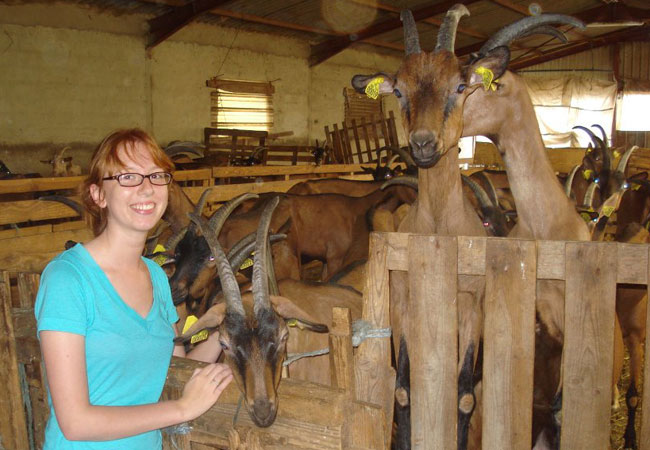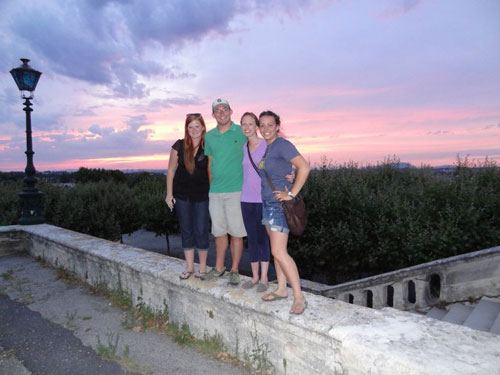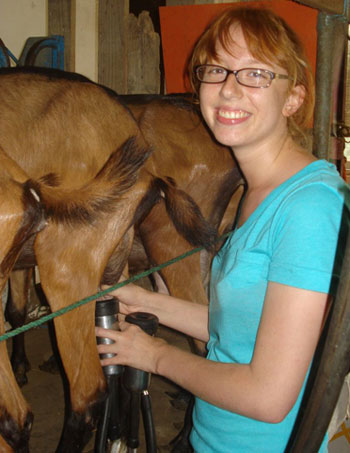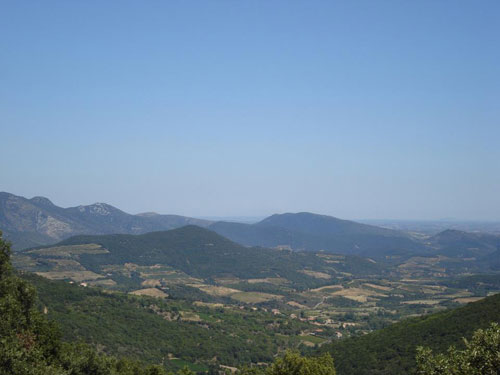Student Gets 'Valuable' Education During French Internship
April 23, 2012
SHSU Media Contact: Meredith Mohr
 |
| During a summer of studying value-added agriculture, Crane got hands-on experience at a French farm that was turning unsalable goat's milk into cheese. —Submitted photos |
It was perhaps the farthest thing from what she imagined when she first heard about an internship in France studying value-added agriculture.
Sam Houston State University junior Taylor Crane thought she was going to be spending a month at a vineyard in the south of France, one of three placements the study abroad program with Michigan State University offered.
Instead, she found herself traipsing about in the mud amidst goats on a farm that had been established in 1660 and loving it.
Crane, a sociology major and an English and French minor, heard about the study abroad program offered by MSU from her sociology professor at SHSU, Douglas Constance.
He encouraged her to apply, and she was accepted to the internship as an “out-of-state student.”
The internship, from June to September 2011, required much of her, Crane said. The first month was spent in Montpellier, a town about six hours from Paris, taking 80 hours of intensive French classes.
During this time, she and her classmates were on their own, without their American professors, but had exercises and projects to do. They went to the French market to see how it worked and other excursions, which included a lot of travel to little towns in the French countryside. Before leaving the United States, Crane had four years of French in high school and few semesters of college French.
 |
| Crane (second from right) and her fellow Michigan State University interns explored the small towns and interacted with the locals during their study abroad experience. |
“It was incredible, though really overwhelming,” Crane said. “I was pretty much alone, and I was only 19 at the time. We did everything by ourselves, and although I had been to France once before for two weeks with a big group, this time it was completely different. There wasn’t anyone there to help you with the language or how to figure out the differences in their country. But in the end, it gave me such a sense of independence. I did it on my own, and that felt awesome.”
In the second month, the internship took them out of an academic setting and put them into real-life experience. Crane was the only out-of-state student to receive a placement at the goat farm, along with three others from MSU. There, they lived with a family who ran the farm and learned the ins and outs of agriculture from a rather muddy perspective, Crane said.
“We had to get up really early and do all the chores, and I really learned the way of farm life there,” Crane said. “We worked with the sun. The farm had been in their family since 1660; that’s older than our country! The reality of that was just incredible. The house was built in 1823 out in the country, far from the city. It was really rural, but beautiful, and entrenched with history and tradition.”
Value-added agriculture is the process of changing or transforming a product from its original state to a more valuable state, typically to a product that is preferred or valued in the marketplace.
In Crane’s internship program, three kinds of value-added agriculture were emphasized: grapes made into wine, olives made into olive oil, and goat milk made into cheese.
Crane said another important part of value-added agriculture is the concept of protected geographical indications, or protected geographical status. This term refers to the legal regulations that ensure the authenticity of a product from a specific region.
“The farm I stayed on had tried to sell goat’s milk, but it was largely unsuccessful,” Crane said. “The action of making that unsalable milk into cheese made it more valuable to consumers who wanted artisanal goat cheese. The French goat cheese was under protected geographical status too, which is heavily dependent on the environment it is made in and the processes it is made with. The French hold to this idea of ‘terroir,’ meaning roughly, ‘taste of place’. This cheese is special because the process and production is special. The Big Mac is a Big Mac regardless of if you buy it in Texas or New York or Paris or Tokyo or South Africa. Place doesn’t matter. But to the French, it is everything.”
Crane plans to study the sociology of agriculture and food systems in graduate school. She said during her time in France, the sharp contrast from the United States made her realize how important to society it is to study this.
“My aspiration has been reaffirmed by my trip to France,” Crane said. “In the United States the high rates of obesity, food poisoning, lack of access to healthy and safe food, among other problems, are incredibly prevalent and indicative of problems that need to be explored and fixed. I hope to have some effect on the system and the way that we, as a society, understand and consume food.”
 |
| Crane got literal hands-on agricultural experience, doing things such as milking goats. |
Crane said studying the processes of making food and working on a farm taught her even more about how sociology and agriculture go hand-in-hand.
“Sociology is the study of society and how the relationships around us influence our behavior and attitudes. On a basic level, food is the beginning of everyone’s lives. It fosters communities, habits and behaviors,” Crane said. “Generally speaking, if a person grows up in a family facing poverty and eats fast food everyday, then this how our relationships influence our food ‘behaviors.’ On the other hand, if you have a family that comes together every Sunday to have family dinner then that food could be a means to express culture and community. On a larger scale, agriculture historically has been a huge industry for the United States. I think at its height there were something like seven million farms in 1910 and now there are less than three million farms.
“So why? There you get back to sociology and social change,” she said. “What caused such a change? And how does it affect us? The discussion of food justice, genetically modified organisms (GMOs), food safety and sustainability are increasingly more popular and important. For me, the connection between sociology and agriculture comes in my study of local indicators and how it affects the farmer, consumer and the community. In a time where our food is killing us, the questions about how, when, where it is being produced need to be asked.”
Besides experiencing the real-life connection between agriculture and sociology and drastically improving her French, Crane said she got so much more out of the experience than the academic benefits.
“We were in one place for two months, and that really made a difference,” Crane said. “The first time I went to France, we crammed a ton of places into two weeks and you didn’t really get to experience anything because you didn’t have the time. Here, we made friends with the pizza man down the street and this little French lady that sold us purses. We spent time with the family we were living with, had meals with them and learned about what their lives were like.”
While in France, Crane stayed with Josette and Michele Mariner, an older couple with adult children, and his 90-year-old mother who lived with them. Robert, Josette’s brother, was the cheese maker and heir to the farm. They all spoke only French, a limitation Crane said wasn’t the only cultural difference between them.
“They thought when I spoke French it sounded funny because of my accent,” Crane said. “They were really fascinated by American (and especially Texas) culture—the general stereotypes of John Wayne and the Wild West were alive and well. I was very surprised at how much they worked. Josette was 60 and there were no days off on a farm; we got up everyday and had to be ready to milk at 6:30a.m. and have breakfast at eight. Our days didn't end until after a late dinner at 10:30. On a farm, you have to work when the sun is up.
“Their work ethic and resourcefulness was really incredible; everything they did was sustainable, not because they had some incentive but because it was better for the farm, the land, and for the family to be this way,” Crane said. “It was also a really big deal how young I was to them. They called me ‘le bebe.’ They loved making fun of me for my terrible French, my lack of knowledge about farming, and how I didn't know the food they enjoyed so much. They ate pigeon, rabbit, sheep, horse, boar and duck. Well, I had never eaten a pigeon before, let alone slaughtered one!”
 |
| The view from the Mariner farm, in France, where Crane spent the summer learning about value-added agriculture. |
But her favorite cultural gap came from her Texas roots.
“Being a Texan in France was super fun because everyone loves Texas and has hilarious stereotypes about the whole state,” Crane said. “The amount of times people asked if I had a horse and if we had a special place to tie them up when we went to school was insane. The impression is that Texas is very much the Wild West. I had so many people fire imaginary guns at me and laugh about my accent. I had no idea that the Texas stereotypes were so strong!”
Crane emphasized that the success of her time in France would not have been possible with out the encouragement and financial support from the Elliott T. Bowers Honors College and the sociology department.
“I was really lucky to have been able to do this,” Crane said. “It’s so important to form good relationships with your professors, because that’s how these opportunities happen. And the Honors College was instrumental in funding and supporting me 100 percent. “
In the end, Crane said she learned things about herself in France that surprised her and changed her.
“I didn’t expect to love the goat farm so much,” Crane said. “I expected to spend a month on a vineyard, without so much mud. I’m totally not the type to have done that, but it was the best thing. It stretched me. That’s what study abroad can do for you – show you that things you never expected are possible and really worth it.”
- END -
This page maintained by SHSU's Communications Office
Associate Director: Julia May
Manager: Jennifer Gauntt
Located in the 115 Administration Building
Telephone: 936.294.1836; Fax: 936.294.1834
Please send comments, corrections, news tips to Today@Sam.edu.

 SamWeb
SamWeb My Sam
My Sam E-mail
E-mail

